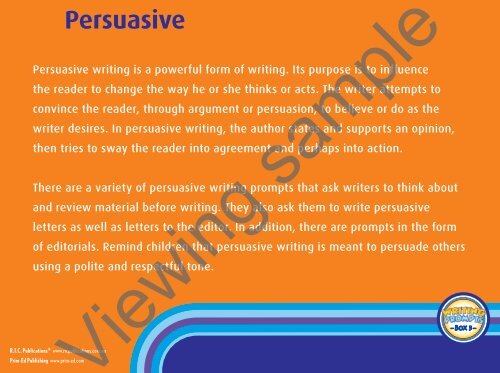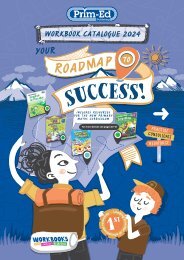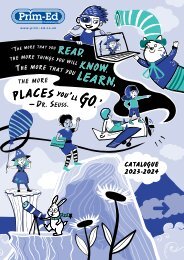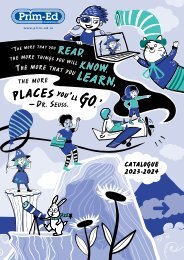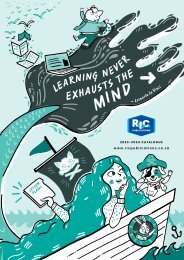PR-6935IRE Writing Prompts - Box 3
Create successful ePaper yourself
Turn your PDF publications into a flip-book with our unique Google optimized e-Paper software.
R.I.C. Publications ® www.ricpublications.com.au<br />
Prim-Ed Publishing www.prim-ed.com<br />
Persuasive<br />
Persuasive writing is a powerful form of writing. Its purpose is to influence<br />
the reader to change the way he or she thinks or acts. The writer attempts to<br />
convince the reader, through argument or persuasion, to believe or do as the<br />
writer desires. In persuasive writing, the author states and supports an opinion,<br />
then tries to sway the reader into agreement and perhaps into action.<br />
There are a variety of persuasive writing prompts that ask writers to think about<br />
and review material before writing. They also ask them to write persuasive<br />
letters as well as letters to the editor. In addition, there are prompts in the form<br />
of editorials. Remind children that persuasive writing is meant to persuade others<br />
using a polite and respectful tone.<br />
iewing sample
Persuasive 1<br />
Exposition<br />
R.I.C. Publications ® www.ricpublications.com.au<br />
By your age, you probably have had many<br />
opportunities to participate in after-school clubs and organisations.<br />
What do you think of the activities offered at your school? Are there<br />
enough activities provided? Which activities do you think should<br />
be included? Who should pay for these activities? How should they<br />
be supervised? Discuss these issues in an editorial on the topic. Be<br />
persuasive yet respectful in your writing.<br />
Viewing sample<br />
Prim-Ed Publishing www.prim-ed.com
Imaginative<br />
Narrative writing is typically the most comfortable form of writing for most<br />
people. Narrative writing tells a story or an experience and can be a story that is<br />
imaginative and creative. This is called fictional narrative.<br />
Remind children to incorporate a setting, characters and plot when necessary. All<br />
details should work together in an integrated way to create a complete story with<br />
a beginning, middle and end.<br />
Poetry writing is the height of creative writing. Poetry allows writers to express<br />
thoughts, ideas and impressions. It incorporates pattern and rhythm, and it can<br />
evoke feelings and emotions. Because of these characteristics, poetry writing can<br />
be difficult for less experienced writers. Be sure to use plenty of modelling and<br />
allow children to work together when needed.<br />
R.I.C. Publications ® www.ricpublications.com.au<br />
Prim-Ed Publishing www.prim-ed.com<br />
Viewing sample
Imaginative 1<br />
Narrative<br />
R.I.C. Publications ® www.ricpublications.com.au<br />
Pretend you are an Olympic athlete. Write a narrative<br />
about your sacrifices and battles to get to the games.<br />
Imagine you are the winner of a gold medal.<br />
Viewing sample<br />
Prim-Ed Publishing www.prim-ed.com
R.I.C. Publications ® www.ricpublications.com.au<br />
Prim-Ed Publishing www.prim-ed.com<br />
Informative<br />
Informative writing is writing for real purposes and audiences. It is writing that<br />
is organised into paragraphs with a topic or a main idea sentence. It requires the<br />
author to plan, research and organise material. There are no imaginary scenarios.<br />
Informative writing can be difficult for less experienced writers. Be prepared<br />
to do a lot of modelling before asking your class to write pieces independently.<br />
These writing prompts ask writers to explain or inform the reader about a specific<br />
topic. Some prompts ask writers to briefly research a topic before beginning the<br />
writing. You may wish to have reference material available.<br />
Viewing sample


